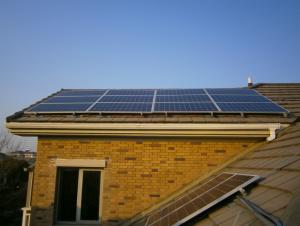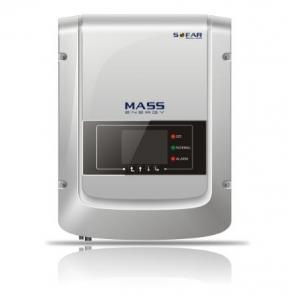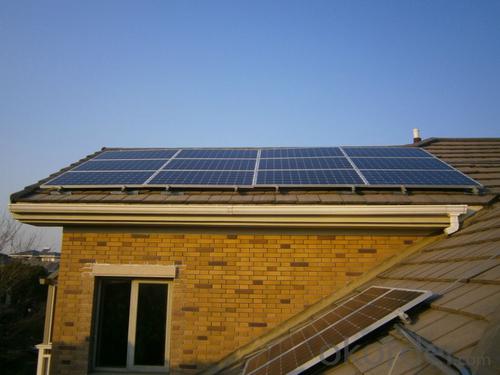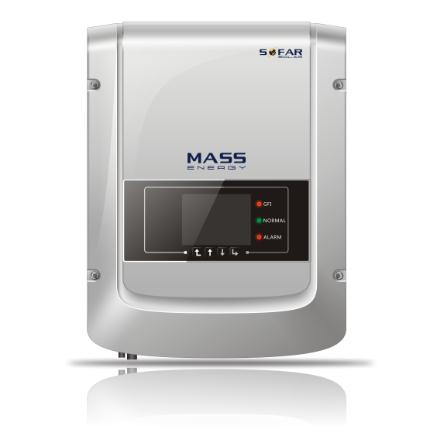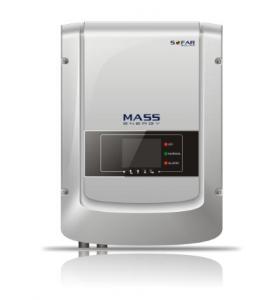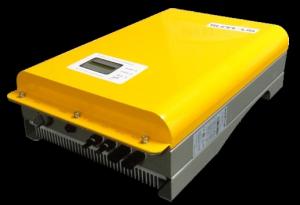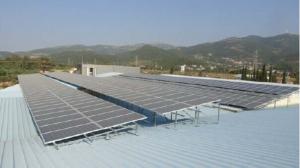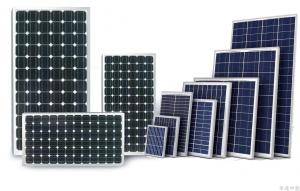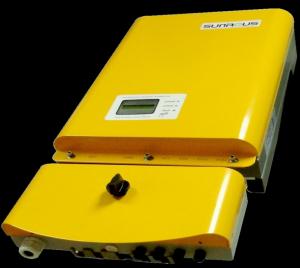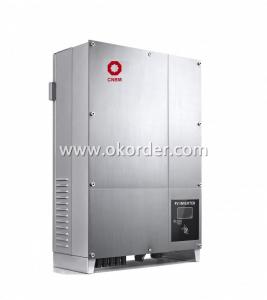400 Watt Grid-Tied Solar PV Inverter 1600TL Good Quality
- Loading Port:
- Shekou
- Payment Terms:
- TT or LC
- Min Order Qty:
- 10 unit
- Supply Capability:
- 99999 unit/month
OKorder Service Pledge
OKorder Financial Service
You Might Also Like
Grid-tied solar PV inverter 1600TL Good Quality
High-yield of PV inverter
•Max 97.1%efficiency
•Real timeprecise MPPT algorithm for max harvest
•Wide inputvoltage operation range from 90V to 500V
All in one. Flexible and economicalsystem solution of PV inverter
•Free siteselection due to IP65
•Easy installationand maintenance due to “Plug & Play” connection
•Interfaceselection-Wi-Fi/ RS485 / Dry Relay for more flexible
•configurationandsystem monitoring
•4” LCDdisplay
•
Low maintenance cost
•Rust-freealuminumcovers
•Flexiblemonitoring solution
•Multifunctionrelay can be configured to show various inverter information
Intelligent gridmanagement
•Reactivepowercapability
•Self powerreduce when over frequency
•Remoteactive/reactivepower limit control
PV inverter datasheet
Technical Data | SOFAR 1100TL | SOFAR 1600TL | SOFAR 2200TL | SOFAR 2700TL | SOFAR 3000TL | |
Input (DC) | ||||||
Max. Input Power | 1100W | 1600W | 2200W | 2700W | 3000W | |
No. of MPPT / String per MPPT | 1/1 | |||||
Max. Input voltage | 450V | 450V | 500V | 500V | 500V | |
Max. Input Voltage | 80V | |||||
Rated input voltage | 360V | |||||
Operating input voltage range | 90V-400V | 100V-480V | ||||
MPPT voltage range | 110V-380V | 165V-380V | 170-450V | 210-450V | 230V-450V | |
Max. Input current per MPPT | 10A | 13A | ||||
Input short circuit current per MPPT | 12A | 15A | ||||
Output(AC) | ||||||
Rated power(@230V,50Hz) | 1000VA | 1500VA | 2000VA | 2500VA | 2800VA | |
Max. AC power | 1000VA | 1500VA | 2000VA | 2500VA | 2800VA | |
Max. AC Output Current | 4.5A | 7A | 9.5A | 11.5A | 13A | |
Rated Grid Voltage | 230V | |||||
Nominal Grid Voltage Range | 180V-270V(According to local standard) | |||||
Rated Frequency | 50Hz / 60Hz | |||||
Grid frequency Range | 44~55 / 54~66Hz(According to local standard) | |||||
THDi | <3% | |||||
Power factor Adjustable Range | 0.8 over excited … 0.8 under excited | |||||
Grid connection | Single phase | |||||
Efficiency | ||||||
Max. efficiency | 97% | 97.1% | ||||
Weighted eff.(EU/CEC) | 96% | 96.2% | 96.3% | |||
MPPT efficiency | >99.5% | |||||
Standard | ||||||
EMC | EN 61000-6-1, EN 61000-6-2, EN 61000-6-3, EN 61000-6-4 | |||||
RSSR | IEC 62109-1, IEC 62109-2 | |||||
Grid Standards | AS4777, VDE4105, C10-C11, G83/G59 (more available on request) | |||||
Protection | ||||||
Anti-Islanding Protection | Yes | |||||
DC reverse polarity protection | Yes | |||||
Over Temp Protection | Yes | |||||
Leakage Current Protection | Yes | |||||
Over Voltage Protection | Yes | |||||
Over Current Protection | Yes | |||||
Earth Fault Protection | Yes | |||||
Communication | ||||||
Standard Communication Mode | Wifi+RS485 | |||||
Operation Data Storage | 25 years | |||||
Relay | Yes | |||||
I/O | Yes | |||||
General data | ||||||
DC Switch | optional | |||||
Ambient temperature range | -25℃ ~ +60℃ | |||||
Topology | Transformerless | |||||
Cooling | Nature | |||||
Allowable relative humidity range | 0 ~ 95% no condensing | |||||
Max. Operating Altitude | 2000m | |||||
Noise | <35dB @1m | |||||
Degree of Protection (per IEC 60529) | IP65 | |||||
Dimension | 400*310*130mm | |||||
Weight | 11kg | 12kg | ||||
Self-consumption at night | 0 | |||||
Display | Graphic display | |||||
Warranty | 5 years | |||||
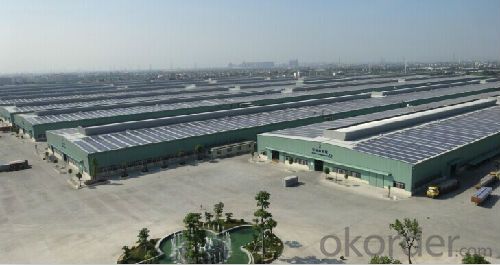
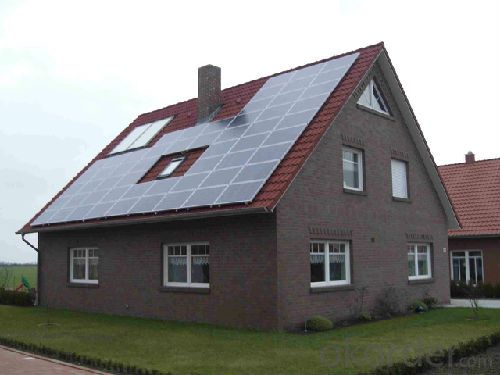
FAQ
1. Have any design tool and how to use it?
Shine Design is the system design software just for inverters, It can conduct installers to figure out panel numbers for a system, panel numbers for each string, and which inverter model is suitable for the system. Moreover, it can print a design report after input all necessary parameters, can calculate DC/AC wire wastage, annual generation, etc.
2. Does the inverter have monitoring solutions for residential system?
For small rating system, we have wired two monitoring solution (ShineNet via RS232 or RS485). (a) Local wireless monitoring solution (ShineVision via RF module communication) (b) Global wireless monitoring solution (WIFI module via WIFI network)
3. Do you have free solution for monitoring?
ShineNet is an inverter monitoring software run in Windows XP, Windows Vista, Windows 7 operating system. It can monitor inverter via RS232 (or RS232 convert to USB cable) and RS485 wire connection. Customers can purchase the cable locally to get the inverter monitored, it is simple.
- Q: Can a solar inverter be installed in a multi-storey building?
- Yes, a solar inverter can be installed in a multi-storey building. The installation of a solar inverter in a multi-storey building follows the same principles as in any other building. The solar panels are typically installed on the rooftop or any other open area where they can receive maximum sunlight. The generated DC power from the solar panels is then converted into AC power by the solar inverter. In a multi-storey building, the solar inverter can be installed either on the rooftop or in a dedicated room or space on one of the floors. The installation location should be chosen based on factors such as ease of access, ventilation, and proximity to the solar panels. It is important to ensure that the inverter is installed in a safe and secure location that complies with local building codes and regulations. Additionally, the wiring and cabling required for connecting the solar panels to the inverter should be properly installed, taking into consideration the vertical distance between the panels and the inverter. Adequate protection measures should also be taken to prevent any damage or electrical hazards during the installation process. Overall, with proper planning and installation techniques, a solar inverter can be easily installed in a multi-storey building, helping to harness solar energy and reduce electricity costs for the residents or occupants.
- Q: Can a solar inverter be used with different types of electrical appliances?
- Yes, a solar inverter can be used with different types of electrical appliances as long as the appliances are compatible with the inverter's power output. The inverter converts the direct current (DC) generated by the solar panels into alternating current (AC), which can be used to power various electrical devices. However, it is important to ensure that the inverter's capacity and voltage output are suitable for the specific appliances to avoid damage or malfunction.
- Q: How do you choose the right size solar inverter for your system?
- To choose the right size solar inverter for your system, you need to consider two key factors: the maximum power output of your solar panels and the maximum power demand of your electrical appliances. The solar inverter should be able to handle the peak power output of your solar panels and should have a capacity slightly higher than the maximum power demand of your appliances. It is important to ensure a proper match between the solar inverter and your system's power requirements to optimize energy production and ensure efficient operation.
- Q: Can a solar inverter be monitored remotely?
- Yes, a solar inverter can be monitored remotely. With the help of advanced technologies and internet connectivity, solar inverters can be connected to a monitoring system that allows real-time monitoring and control from a remote location. This remote monitoring feature enables users to track the performance, energy production, and potential issues of their solar inverters without being physically present at the installation site.
- Q: Can a solar inverter be used in a mobile or portable solar power system?
- Yes, a solar inverter can be used in a mobile or portable solar power system. Solar inverters are designed to convert the DC (direct current) electricity generated by solar panels into AC (alternating current) electricity that can be used to power various devices. In a mobile or portable solar power system, the solar inverter plays a crucial role in converting the energy collected by the solar panels into a usable form for powering appliances or charging batteries.
- Q: How does a solar inverter protect against overvoltage or overcurrent?
- A solar inverter protects against overvoltage or overcurrent by constantly monitoring the electrical output from the solar panels. It uses built-in protection mechanisms such as surge protectors, voltage regulation circuits, and current limiters to prevent the voltage or current from exceeding safe levels. If an overvoltage or overcurrent event occurs, the inverter will automatically shut down or reduce the output to protect the system and connected devices from potential damage or failure.
- Q: What are the different types of solar inverters available?
- There are several types of solar inverters available, including string inverters, microinverters, and power optimizers.
- Q: What is the role of maximum power control in a solar inverter?
- The role of maximum power control in a solar inverter is to optimize the performance and efficiency of the solar PV system. It ensures that the solar panels are operating at their maximum power point, allowing them to generate the highest possible amount of electricity from the available sunlight. This control mechanism adjusts the voltage and current levels to match the load requirements, enabling the inverter to deliver the maximum power output to the grid or connected devices. By actively managing and regulating the power flow, maximum power control helps to maximize the overall energy production and utilization of the solar installation.
- Q: Can a solar inverter be used with a solar-powered food dehydrator?
- Yes, a solar inverter can be used with a solar-powered food dehydrator. A solar inverter is responsible for converting the direct current (DC) generated by solar panels into alternating current (AC) that is suitable for powering household appliances. Since a food dehydrator operates on AC power, using a solar inverter allows the solar energy captured by the panels to be utilized effectively in powering the dehydrator.
- Q: Can a solar inverter be used with a grid-interactive system?
- Yes, a solar inverter can be used with a grid-interactive system. In fact, a solar inverter is an essential component of a grid-interactive system as it converts the DC (direct current) electricity produced by solar panels into AC (alternating current) electricity that can be used to power homes or businesses and also fed back into the grid. The solar inverter also manages the flow of electricity between the solar panels, batteries (if present), and the grid, ensuring efficient and safe operation of the grid-interactive system.
Send your message to us
400 Watt Grid-Tied Solar PV Inverter 1600TL Good Quality
- Loading Port:
- Shekou
- Payment Terms:
- TT or LC
- Min Order Qty:
- 10 unit
- Supply Capability:
- 99999 unit/month
OKorder Service Pledge
OKorder Financial Service
Similar products
Hot products
Hot Searches
Related keywords
